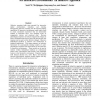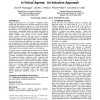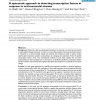7 search results - page 1 / 2 » Predicting User Physiological Response for Interactive Envir... |
AIIDE
2006
13 years 6 months ago
2006
Affective reasoning holds great potential for interactive digital entertainment, education, and training. Incorporating affective reasoning into the decision-making capabilities o...
UM
2007
Springer
13 years 10 months ago
2007
Springer
Accurately recognizing users’ affective states could contribute to more productive and enjoyable interactions, particularly for task-oriented learning environments. In addition t...
UMUAI
2008
13 years 4 months ago
2008
Abstract. Self-efficacy is an individual's belief about her ability to perform well in a given situation. Because selfefficacious students are effective learners, endowing int...
ATAL
2008
Springer
13 years 6 months ago
2008
Springer
Humans continuously assess one another's situational context, modify their own affective state, and then respond based on these outcomes through empathetic expression. Virtua...
10
Voted
BMCBI
2007
13 years 4 months ago
2007
Background: Eukaryotic cells have developed mechanisms to respond to external environmental or physiological changes (stresses). In order to increase the activities of stress-prot...



